Analysis of Corporate Financial Reporting and US Regulations
VerifiedAdded on 2021/05/27
|12
|2843
|26
Report
AI Summary
This report provides an in-depth analysis of corporate financial reporting, focusing on the challenges and implications of International Financial Reporting Standards (IFRS) in Australia, as highlighted by concerns from CFOs and directors. It evaluates the non-amendment of the Corporation Act under various theories such as Public Interest, Capture, and Economic Interest Group. Furthermore, the report outlines the rules and regulations governing US corporate financial statements, emphasizing the importance of faithful representation and asset revaluation. The motivations behind revaluing property, plant, and equipment are explored, along with the potential impacts of not doing so on financial statements and shareholder wealth. The document concludes by underscoring the necessity for clear, verifiable, and understandable financial reporting to facilitate informed investment decisions.
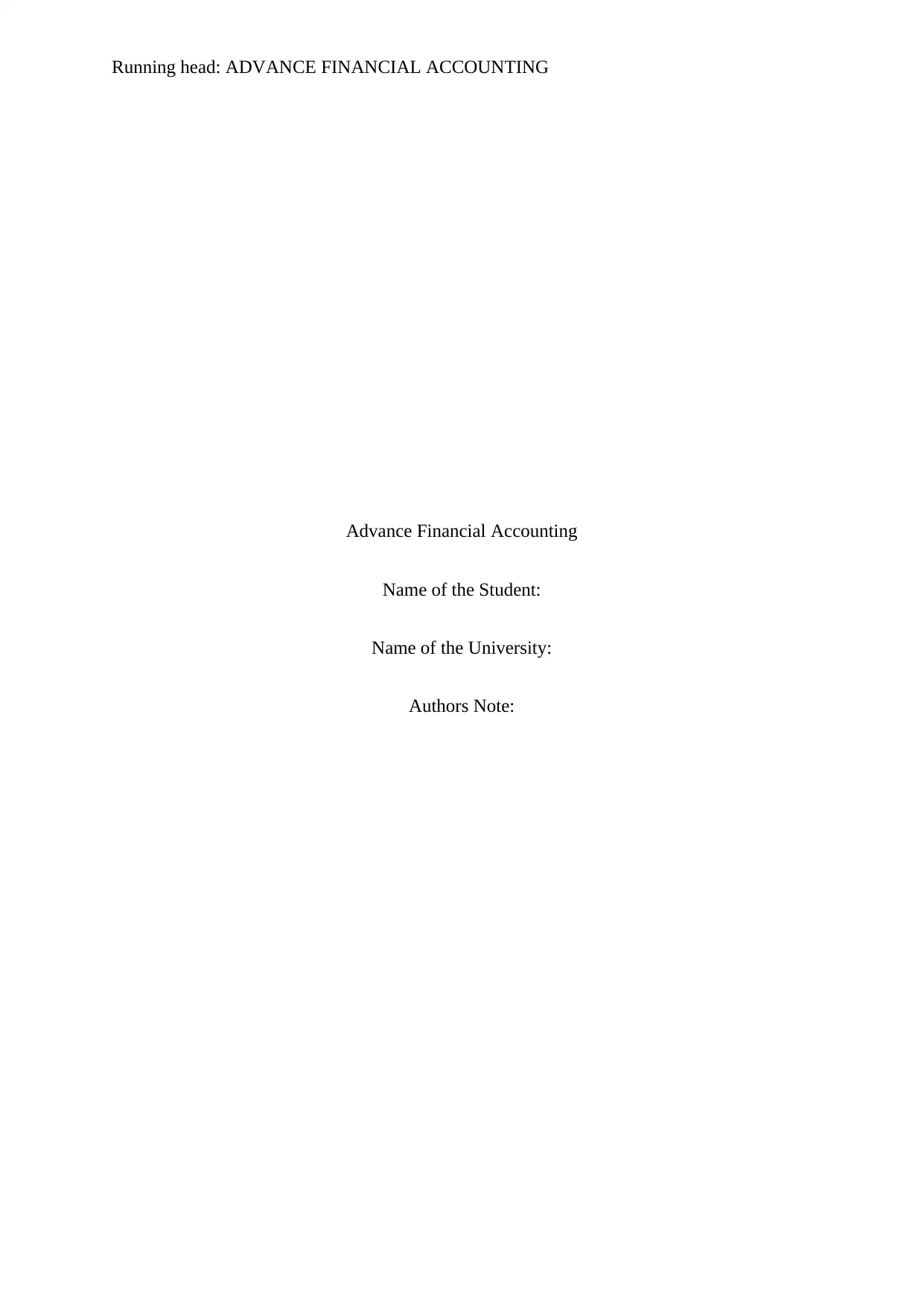
Running head: ADVANCE FINANCIAL ACCOUNTING
Advance Financial Accounting
Name of the Student:
Name of the University:
Authors Note:
Advance Financial Accounting
Name of the Student:
Name of the University:
Authors Note:
Paraphrase This Document
Need a fresh take? Get an instant paraphrase of this document with our AI Paraphraser
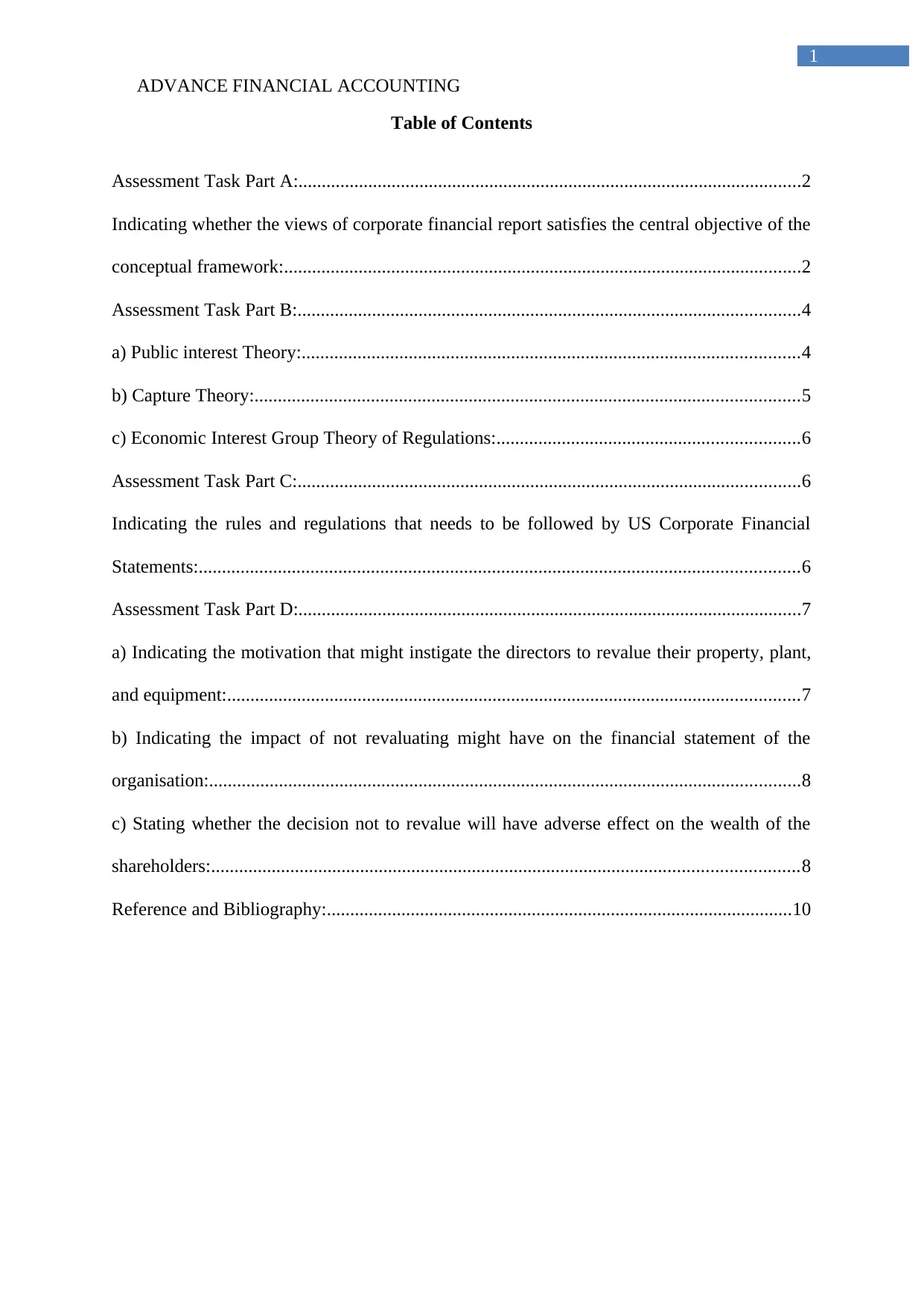
ADVANCE FINANCIAL ACCOUNTING
1
Table of Contents
Assessment Task Part A:............................................................................................................2
Indicating whether the views of corporate financial report satisfies the central objective of the
conceptual framework:...............................................................................................................2
Assessment Task Part B:............................................................................................................4
a) Public interest Theory:...........................................................................................................4
b) Capture Theory:.....................................................................................................................5
c) Economic Interest Group Theory of Regulations:.................................................................6
Assessment Task Part C:............................................................................................................6
Indicating the rules and regulations that needs to be followed by US Corporate Financial
Statements:.................................................................................................................................6
Assessment Task Part D:............................................................................................................7
a) Indicating the motivation that might instigate the directors to revalue their property, plant,
and equipment:...........................................................................................................................7
b) Indicating the impact of not revaluating might have on the financial statement of the
organisation:...............................................................................................................................8
c) Stating whether the decision not to revalue will have adverse effect on the wealth of the
shareholders:..............................................................................................................................8
Reference and Bibliography:....................................................................................................10
1
Table of Contents
Assessment Task Part A:............................................................................................................2
Indicating whether the views of corporate financial report satisfies the central objective of the
conceptual framework:...............................................................................................................2
Assessment Task Part B:............................................................................................................4
a) Public interest Theory:...........................................................................................................4
b) Capture Theory:.....................................................................................................................5
c) Economic Interest Group Theory of Regulations:.................................................................6
Assessment Task Part C:............................................................................................................6
Indicating the rules and regulations that needs to be followed by US Corporate Financial
Statements:.................................................................................................................................6
Assessment Task Part D:............................................................................................................7
a) Indicating the motivation that might instigate the directors to revalue their property, plant,
and equipment:...........................................................................................................................7
b) Indicating the impact of not revaluating might have on the financial statement of the
organisation:...............................................................................................................................8
c) Stating whether the decision not to revalue will have adverse effect on the wealth of the
shareholders:..............................................................................................................................8
Reference and Bibliography:....................................................................................................10

ADVANCE FINANCIAL ACCOUNTING
2
Assessment Task Part A:
Indicating whether the views of corporate financial report satisfies the central objective
of the conceptual framework:
The article ‘Unwieldy rules useless for investors’, relatively indicates the overall
problems and failures of the International Financial Reporting Standards which is being
implemented in the Australian organisation. The article instigated the problems that was
faced by Australian companies during the adoption of International Financial Reporting
Standards and is still not able to provide the adequate measures in accordance with General
Accounting Principles (GAAP). However, the Australian accounting board has a relatively
utilised the international financial reporting standard to improve the level of financial
reporting within its premises. The implementation of different regulations and rules laid
down by the IFRS has mainly helped in minimising any kind of manipulation or problems
related to financial reporting. The only problem that is faced by the organisation while
implementing IFRS is the extra burden on Cost for preparing the financial statement (Beams,
Brozovsky and Shoulders 2017).
Evident statement provided by David Craig:
The statement relatively indicates that annual reports using the IFRS method is
relatively portraying a wrong picture of the management decision and workings to its
investors. The chief financial officer directly indicated that the annual report prepared in
accordance with IFRS is not able to provide adequate and reasonable explanation to the
investors. Instead only the investors with technical capabilities to understand the relevant
notes of financial account would eventually detect the progress and profitability obtained by
the organisation. The simple investors would not be able to understand the level of
2
Assessment Task Part A:
Indicating whether the views of corporate financial report satisfies the central objective
of the conceptual framework:
The article ‘Unwieldy rules useless for investors’, relatively indicates the overall
problems and failures of the International Financial Reporting Standards which is being
implemented in the Australian organisation. The article instigated the problems that was
faced by Australian companies during the adoption of International Financial Reporting
Standards and is still not able to provide the adequate measures in accordance with General
Accounting Principles (GAAP). However, the Australian accounting board has a relatively
utilised the international financial reporting standard to improve the level of financial
reporting within its premises. The implementation of different regulations and rules laid
down by the IFRS has mainly helped in minimising any kind of manipulation or problems
related to financial reporting. The only problem that is faced by the organisation while
implementing IFRS is the extra burden on Cost for preparing the financial statement (Beams,
Brozovsky and Shoulders 2017).
Evident statement provided by David Craig:
The statement relatively indicates that annual reports using the IFRS method is
relatively portraying a wrong picture of the management decision and workings to its
investors. The chief financial officer directly indicated that the annual report prepared in
accordance with IFRS is not able to provide adequate and reasonable explanation to the
investors. Instead only the investors with technical capabilities to understand the relevant
notes of financial account would eventually detect the progress and profitability obtained by
the organisation. The simple investors would not be able to understand the level of
⊘ This is a preview!⊘
Do you want full access?
Subscribe today to unlock all pages.

Trusted by 1+ million students worldwide
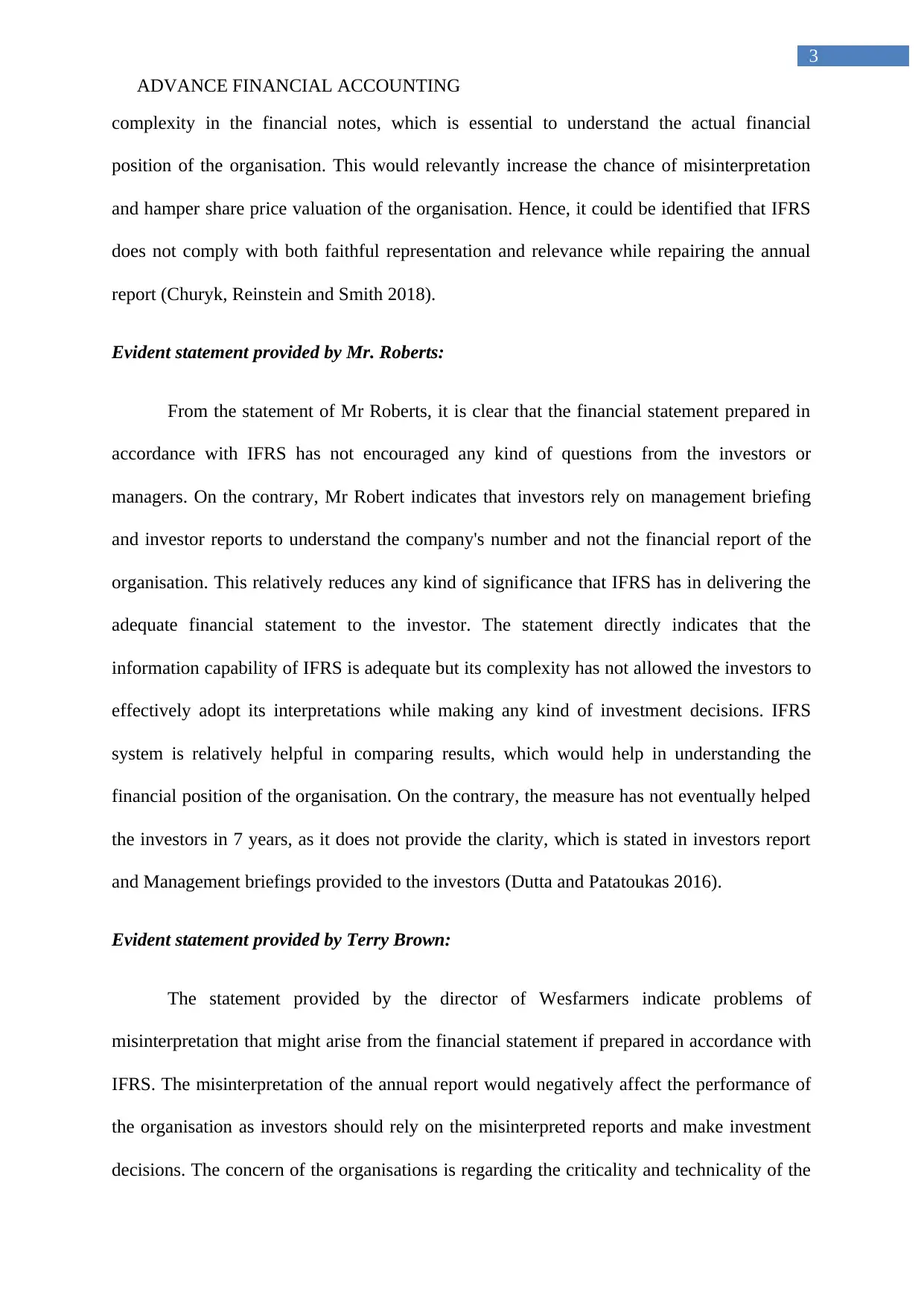
ADVANCE FINANCIAL ACCOUNTING
3
complexity in the financial notes, which is essential to understand the actual financial
position of the organisation. This would relevantly increase the chance of misinterpretation
and hamper share price valuation of the organisation. Hence, it could be identified that IFRS
does not comply with both faithful representation and relevance while repairing the annual
report (Churyk, Reinstein and Smith 2018).
Evident statement provided by Mr. Roberts:
From the statement of Mr Roberts, it is clear that the financial statement prepared in
accordance with IFRS has not encouraged any kind of questions from the investors or
managers. On the contrary, Mr Robert indicates that investors rely on management briefing
and investor reports to understand the company's number and not the financial report of the
organisation. This relatively reduces any kind of significance that IFRS has in delivering the
adequate financial statement to the investor. The statement directly indicates that the
information capability of IFRS is adequate but its complexity has not allowed the investors to
effectively adopt its interpretations while making any kind of investment decisions. IFRS
system is relatively helpful in comparing results, which would help in understanding the
financial position of the organisation. On the contrary, the measure has not eventually helped
the investors in 7 years, as it does not provide the clarity, which is stated in investors report
and Management briefings provided to the investors (Dutta and Patatoukas 2016).
Evident statement provided by Terry Brown:
The statement provided by the director of Wesfarmers indicate problems of
misinterpretation that might arise from the financial statement if prepared in accordance with
IFRS. The misinterpretation of the annual report would negatively affect the performance of
the organisation as investors should rely on the misinterpreted reports and make investment
decisions. The concern of the organisations is regarding the criticality and technicality of the
3
complexity in the financial notes, which is essential to understand the actual financial
position of the organisation. This would relevantly increase the chance of misinterpretation
and hamper share price valuation of the organisation. Hence, it could be identified that IFRS
does not comply with both faithful representation and relevance while repairing the annual
report (Churyk, Reinstein and Smith 2018).
Evident statement provided by Mr. Roberts:
From the statement of Mr Roberts, it is clear that the financial statement prepared in
accordance with IFRS has not encouraged any kind of questions from the investors or
managers. On the contrary, Mr Robert indicates that investors rely on management briefing
and investor reports to understand the company's number and not the financial report of the
organisation. This relatively reduces any kind of significance that IFRS has in delivering the
adequate financial statement to the investor. The statement directly indicates that the
information capability of IFRS is adequate but its complexity has not allowed the investors to
effectively adopt its interpretations while making any kind of investment decisions. IFRS
system is relatively helpful in comparing results, which would help in understanding the
financial position of the organisation. On the contrary, the measure has not eventually helped
the investors in 7 years, as it does not provide the clarity, which is stated in investors report
and Management briefings provided to the investors (Dutta and Patatoukas 2016).
Evident statement provided by Terry Brown:
The statement provided by the director of Wesfarmers indicate problems of
misinterpretation that might arise from the financial statement if prepared in accordance with
IFRS. The misinterpretation of the annual report would negatively affect the performance of
the organisation as investors should rely on the misinterpreted reports and make investment
decisions. The concern of the organisations is regarding the criticality and technicality of the
Paraphrase This Document
Need a fresh take? Get an instant paraphrase of this document with our AI Paraphraser
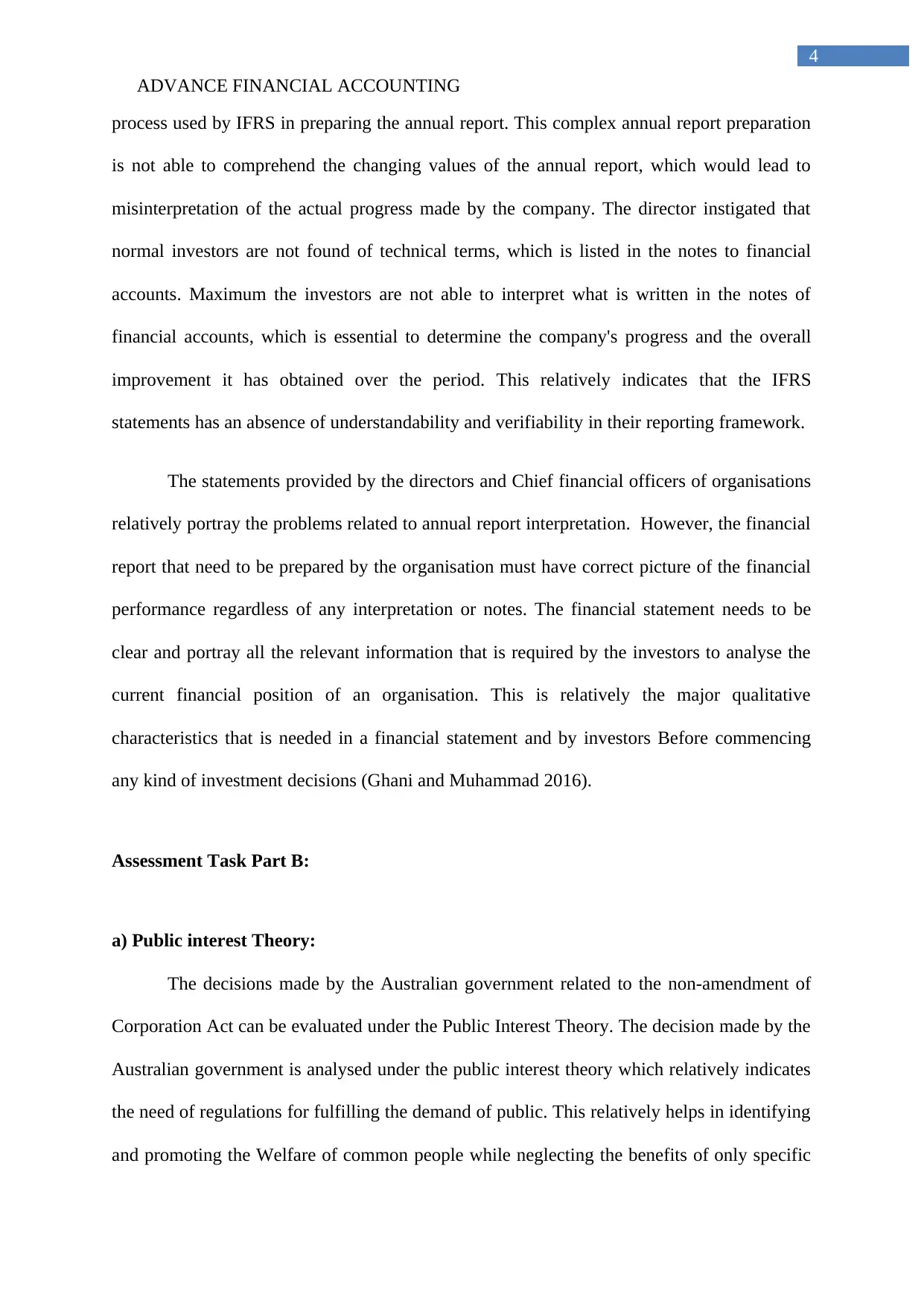
ADVANCE FINANCIAL ACCOUNTING
4
process used by IFRS in preparing the annual report. This complex annual report preparation
is not able to comprehend the changing values of the annual report, which would lead to
misinterpretation of the actual progress made by the company. The director instigated that
normal investors are not found of technical terms, which is listed in the notes to financial
accounts. Maximum the investors are not able to interpret what is written in the notes of
financial accounts, which is essential to determine the company's progress and the overall
improvement it has obtained over the period. This relatively indicates that the IFRS
statements has an absence of understandability and verifiability in their reporting framework.
The statements provided by the directors and Chief financial officers of organisations
relatively portray the problems related to annual report interpretation. However, the financial
report that need to be prepared by the organisation must have correct picture of the financial
performance regardless of any interpretation or notes. The financial statement needs to be
clear and portray all the relevant information that is required by the investors to analyse the
current financial position of an organisation. This is relatively the major qualitative
characteristics that is needed in a financial statement and by investors Before commencing
any kind of investment decisions (Ghani and Muhammad 2016).
Assessment Task Part B:
a) Public interest Theory:
The decisions made by the Australian government related to the non-amendment of
Corporation Act can be evaluated under the Public Interest Theory. The decision made by the
Australian government is analysed under the public interest theory which relatively indicates
the need of regulations for fulfilling the demand of public. This relatively helps in identifying
and promoting the Welfare of common people while neglecting the benefits of only specific
4
process used by IFRS in preparing the annual report. This complex annual report preparation
is not able to comprehend the changing values of the annual report, which would lead to
misinterpretation of the actual progress made by the company. The director instigated that
normal investors are not found of technical terms, which is listed in the notes to financial
accounts. Maximum the investors are not able to interpret what is written in the notes of
financial accounts, which is essential to determine the company's progress and the overall
improvement it has obtained over the period. This relatively indicates that the IFRS
statements has an absence of understandability and verifiability in their reporting framework.
The statements provided by the directors and Chief financial officers of organisations
relatively portray the problems related to annual report interpretation. However, the financial
report that need to be prepared by the organisation must have correct picture of the financial
performance regardless of any interpretation or notes. The financial statement needs to be
clear and portray all the relevant information that is required by the investors to analyse the
current financial position of an organisation. This is relatively the major qualitative
characteristics that is needed in a financial statement and by investors Before commencing
any kind of investment decisions (Ghani and Muhammad 2016).
Assessment Task Part B:
a) Public interest Theory:
The decisions made by the Australian government related to the non-amendment of
Corporation Act can be evaluated under the Public Interest Theory. The decision made by the
Australian government is analysed under the public interest theory which relatively indicates
the need of regulations for fulfilling the demand of public. This relatively helps in identifying
and promoting the Welfare of common people while neglecting the benefits of only specific
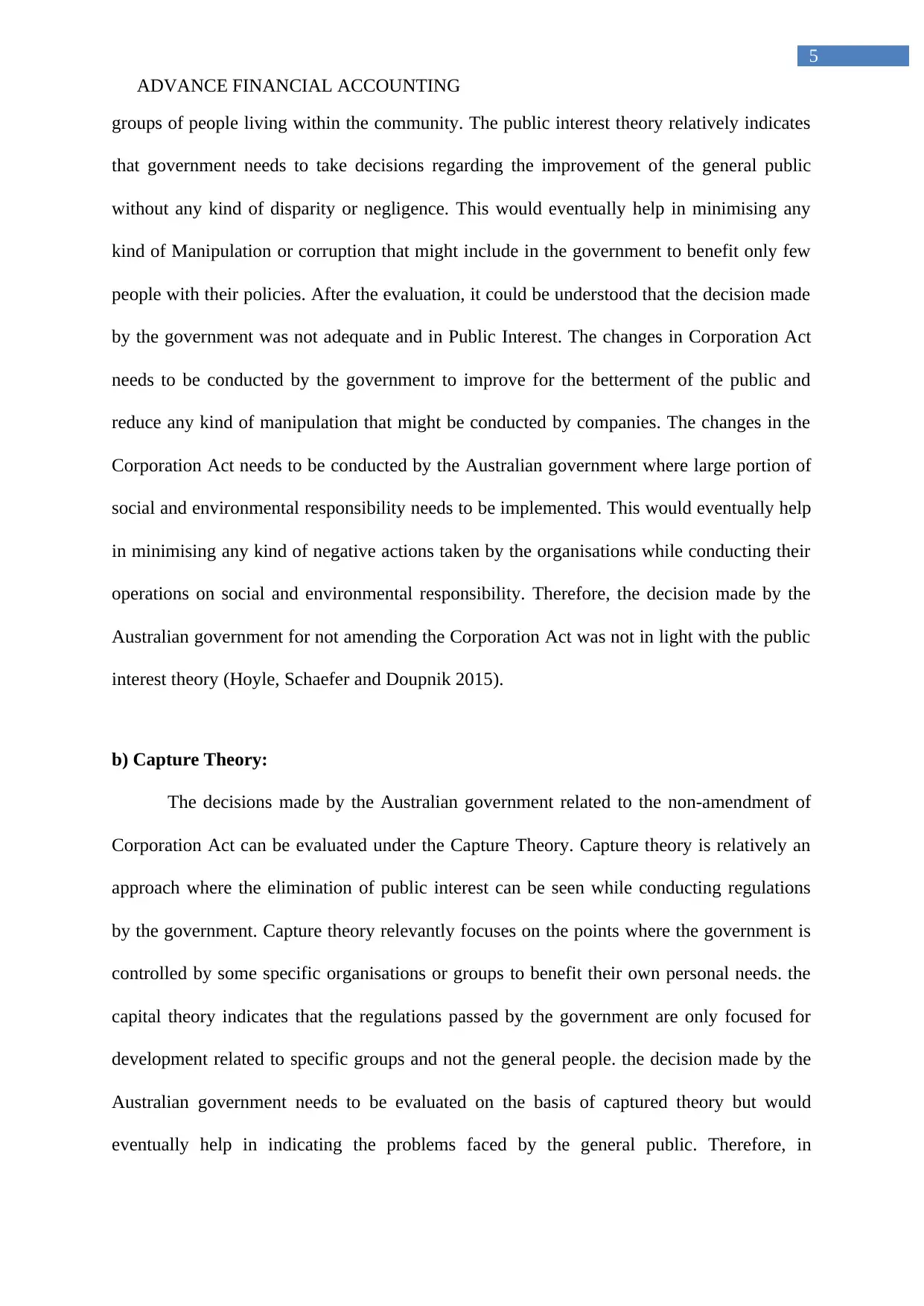
ADVANCE FINANCIAL ACCOUNTING
5
groups of people living within the community. The public interest theory relatively indicates
that government needs to take decisions regarding the improvement of the general public
without any kind of disparity or negligence. This would eventually help in minimising any
kind of Manipulation or corruption that might include in the government to benefit only few
people with their policies. After the evaluation, it could be understood that the decision made
by the government was not adequate and in Public Interest. The changes in Corporation Act
needs to be conducted by the government to improve for the betterment of the public and
reduce any kind of manipulation that might be conducted by companies. The changes in the
Corporation Act needs to be conducted by the Australian government where large portion of
social and environmental responsibility needs to be implemented. This would eventually help
in minimising any kind of negative actions taken by the organisations while conducting their
operations on social and environmental responsibility. Therefore, the decision made by the
Australian government for not amending the Corporation Act was not in light with the public
interest theory (Hoyle, Schaefer and Doupnik 2015).
b) Capture Theory:
The decisions made by the Australian government related to the non-amendment of
Corporation Act can be evaluated under the Capture Theory. Capture theory is relatively an
approach where the elimination of public interest can be seen while conducting regulations
by the government. Capture theory relevantly focuses on the points where the government is
controlled by some specific organisations or groups to benefit their own personal needs. the
capital theory indicates that the regulations passed by the government are only focused for
development related to specific groups and not the general people. the decision made by the
Australian government needs to be evaluated on the basis of captured theory but would
eventually help in indicating the problems faced by the general public. Therefore, in
5
groups of people living within the community. The public interest theory relatively indicates
that government needs to take decisions regarding the improvement of the general public
without any kind of disparity or negligence. This would eventually help in minimising any
kind of Manipulation or corruption that might include in the government to benefit only few
people with their policies. After the evaluation, it could be understood that the decision made
by the government was not adequate and in Public Interest. The changes in Corporation Act
needs to be conducted by the government to improve for the betterment of the public and
reduce any kind of manipulation that might be conducted by companies. The changes in the
Corporation Act needs to be conducted by the Australian government where large portion of
social and environmental responsibility needs to be implemented. This would eventually help
in minimising any kind of negative actions taken by the organisations while conducting their
operations on social and environmental responsibility. Therefore, the decision made by the
Australian government for not amending the Corporation Act was not in light with the public
interest theory (Hoyle, Schaefer and Doupnik 2015).
b) Capture Theory:
The decisions made by the Australian government related to the non-amendment of
Corporation Act can be evaluated under the Capture Theory. Capture theory is relatively an
approach where the elimination of public interest can be seen while conducting regulations
by the government. Capture theory relevantly focuses on the points where the government is
controlled by some specific organisations or groups to benefit their own personal needs. the
capital theory indicates that the regulations passed by the government are only focused for
development related to specific groups and not the general people. the decision made by the
Australian government needs to be evaluated on the basis of captured theory but would
eventually help in indicating the problems faced by the general public. Therefore, in
⊘ This is a preview!⊘
Do you want full access?
Subscribe today to unlock all pages.

Trusted by 1+ million students worldwide
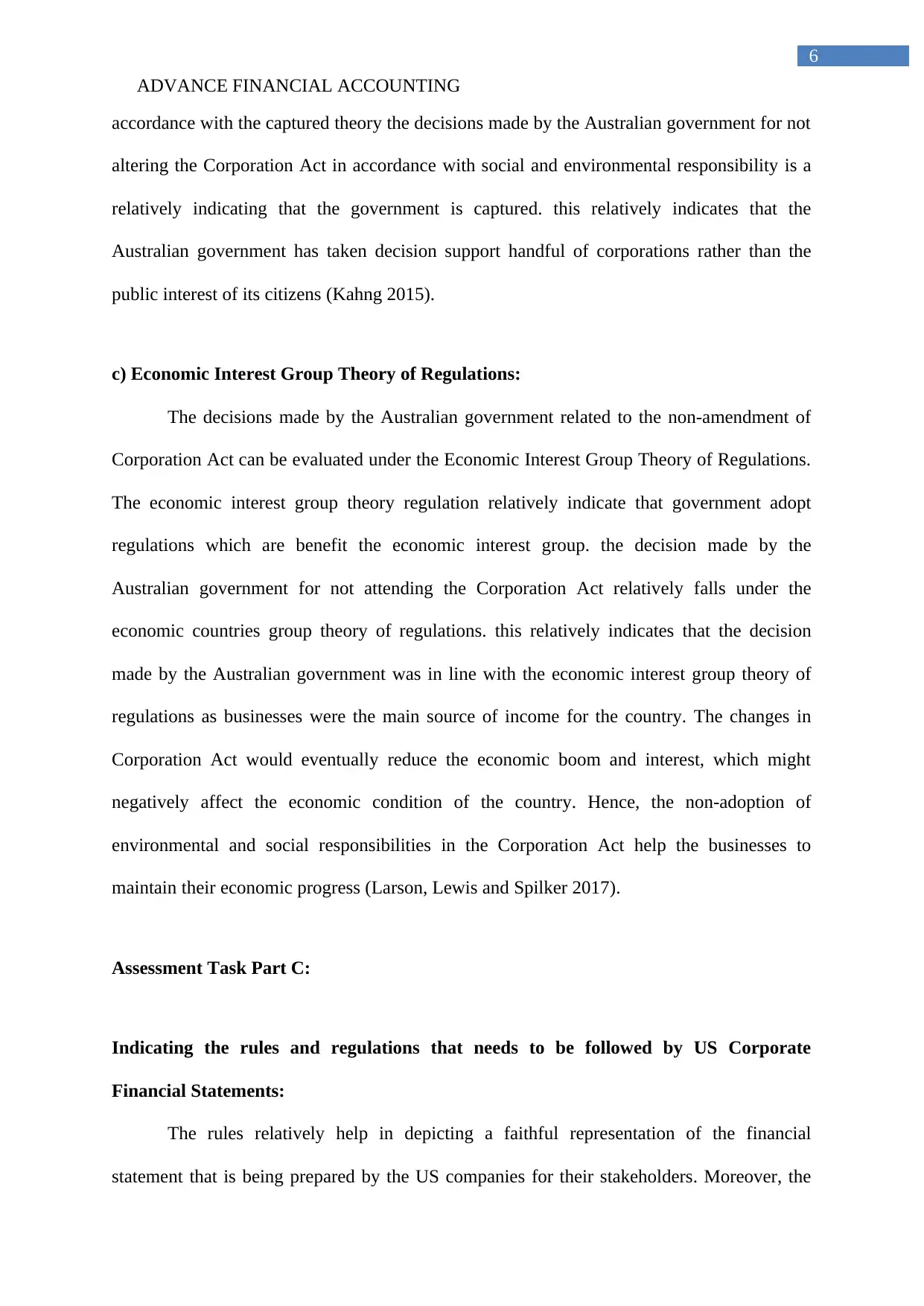
ADVANCE FINANCIAL ACCOUNTING
6
accordance with the captured theory the decisions made by the Australian government for not
altering the Corporation Act in accordance with social and environmental responsibility is a
relatively indicating that the government is captured. this relatively indicates that the
Australian government has taken decision support handful of corporations rather than the
public interest of its citizens (Kahng 2015).
c) Economic Interest Group Theory of Regulations:
The decisions made by the Australian government related to the non-amendment of
Corporation Act can be evaluated under the Economic Interest Group Theory of Regulations.
The economic interest group theory regulation relatively indicate that government adopt
regulations which are benefit the economic interest group. the decision made by the
Australian government for not attending the Corporation Act relatively falls under the
economic countries group theory of regulations. this relatively indicates that the decision
made by the Australian government was in line with the economic interest group theory of
regulations as businesses were the main source of income for the country. The changes in
Corporation Act would eventually reduce the economic boom and interest, which might
negatively affect the economic condition of the country. Hence, the non-adoption of
environmental and social responsibilities in the Corporation Act help the businesses to
maintain their economic progress (Larson, Lewis and Spilker 2017).
Assessment Task Part C:
Indicating the rules and regulations that needs to be followed by US Corporate
Financial Statements:
The rules relatively help in depicting a faithful representation of the financial
statement that is being prepared by the US companies for their stakeholders. Moreover, the
6
accordance with the captured theory the decisions made by the Australian government for not
altering the Corporation Act in accordance with social and environmental responsibility is a
relatively indicating that the government is captured. this relatively indicates that the
Australian government has taken decision support handful of corporations rather than the
public interest of its citizens (Kahng 2015).
c) Economic Interest Group Theory of Regulations:
The decisions made by the Australian government related to the non-amendment of
Corporation Act can be evaluated under the Economic Interest Group Theory of Regulations.
The economic interest group theory regulation relatively indicate that government adopt
regulations which are benefit the economic interest group. the decision made by the
Australian government for not attending the Corporation Act relatively falls under the
economic countries group theory of regulations. this relatively indicates that the decision
made by the Australian government was in line with the economic interest group theory of
regulations as businesses were the main source of income for the country. The changes in
Corporation Act would eventually reduce the economic boom and interest, which might
negatively affect the economic condition of the country. Hence, the non-adoption of
environmental and social responsibilities in the Corporation Act help the businesses to
maintain their economic progress (Larson, Lewis and Spilker 2017).
Assessment Task Part C:
Indicating the rules and regulations that needs to be followed by US Corporate
Financial Statements:
The rules relatively help in depicting a faithful representation of the financial
statement that is being prepared by the US companies for their stakeholders. Moreover, the
Paraphrase This Document
Need a fresh take? Get an instant paraphrase of this document with our AI Paraphraser
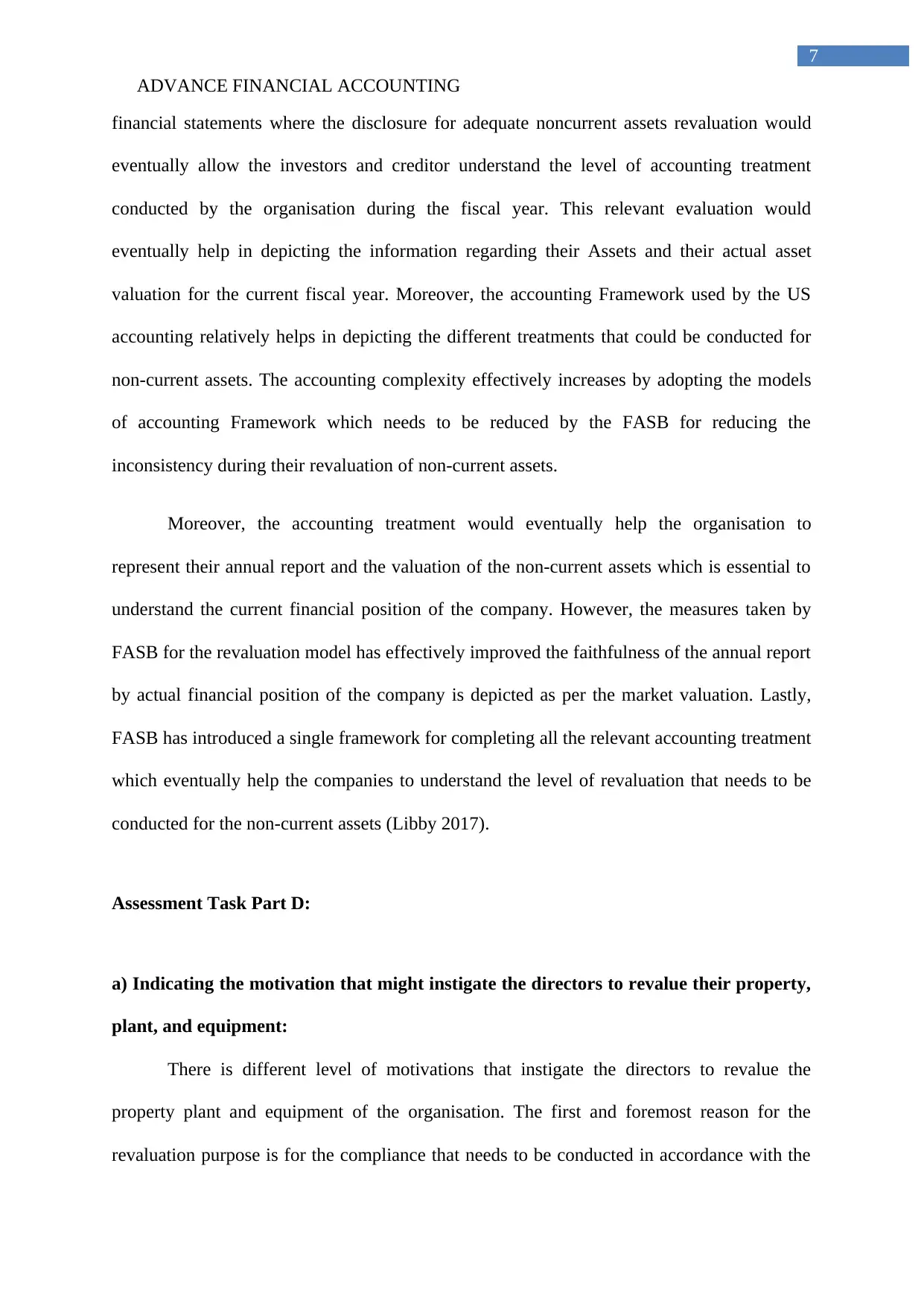
ADVANCE FINANCIAL ACCOUNTING
7
financial statements where the disclosure for adequate noncurrent assets revaluation would
eventually allow the investors and creditor understand the level of accounting treatment
conducted by the organisation during the fiscal year. This relevant evaluation would
eventually help in depicting the information regarding their Assets and their actual asset
valuation for the current fiscal year. Moreover, the accounting Framework used by the US
accounting relatively helps in depicting the different treatments that could be conducted for
non-current assets. The accounting complexity effectively increases by adopting the models
of accounting Framework which needs to be reduced by the FASB for reducing the
inconsistency during their revaluation of non-current assets.
Moreover, the accounting treatment would eventually help the organisation to
represent their annual report and the valuation of the non-current assets which is essential to
understand the current financial position of the company. However, the measures taken by
FASB for the revaluation model has effectively improved the faithfulness of the annual report
by actual financial position of the company is depicted as per the market valuation. Lastly,
FASB has introduced a single framework for completing all the relevant accounting treatment
which eventually help the companies to understand the level of revaluation that needs to be
conducted for the non-current assets (Libby 2017).
Assessment Task Part D:
a) Indicating the motivation that might instigate the directors to revalue their property,
plant, and equipment:
There is different level of motivations that instigate the directors to revalue the
property plant and equipment of the organisation. The first and foremost reason for the
revaluation purpose is for the compliance that needs to be conducted in accordance with the
7
financial statements where the disclosure for adequate noncurrent assets revaluation would
eventually allow the investors and creditor understand the level of accounting treatment
conducted by the organisation during the fiscal year. This relevant evaluation would
eventually help in depicting the information regarding their Assets and their actual asset
valuation for the current fiscal year. Moreover, the accounting Framework used by the US
accounting relatively helps in depicting the different treatments that could be conducted for
non-current assets. The accounting complexity effectively increases by adopting the models
of accounting Framework which needs to be reduced by the FASB for reducing the
inconsistency during their revaluation of non-current assets.
Moreover, the accounting treatment would eventually help the organisation to
represent their annual report and the valuation of the non-current assets which is essential to
understand the current financial position of the company. However, the measures taken by
FASB for the revaluation model has effectively improved the faithfulness of the annual report
by actual financial position of the company is depicted as per the market valuation. Lastly,
FASB has introduced a single framework for completing all the relevant accounting treatment
which eventually help the companies to understand the level of revaluation that needs to be
conducted for the non-current assets (Libby 2017).
Assessment Task Part D:
a) Indicating the motivation that might instigate the directors to revalue their property,
plant, and equipment:
There is different level of motivations that instigate the directors to revalue the
property plant and equipment of the organisation. The first and foremost reason for the
revaluation purpose is for the compliance that needs to be conducted in accordance with the
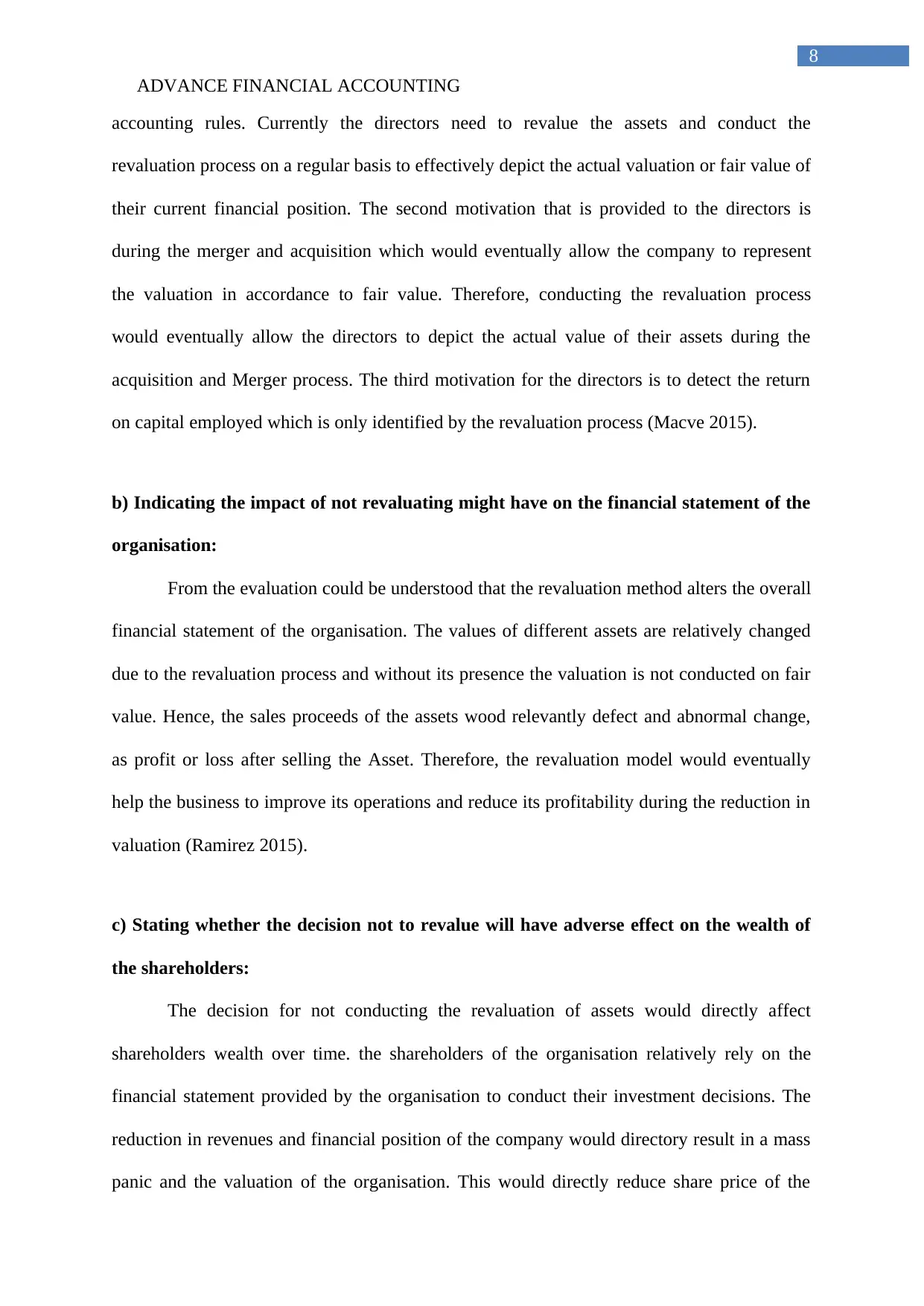
ADVANCE FINANCIAL ACCOUNTING
8
accounting rules. Currently the directors need to revalue the assets and conduct the
revaluation process on a regular basis to effectively depict the actual valuation or fair value of
their current financial position. The second motivation that is provided to the directors is
during the merger and acquisition which would eventually allow the company to represent
the valuation in accordance to fair value. Therefore, conducting the revaluation process
would eventually allow the directors to depict the actual value of their assets during the
acquisition and Merger process. The third motivation for the directors is to detect the return
on capital employed which is only identified by the revaluation process (Macve 2015).
b) Indicating the impact of not revaluating might have on the financial statement of the
organisation:
From the evaluation could be understood that the revaluation method alters the overall
financial statement of the organisation. The values of different assets are relatively changed
due to the revaluation process and without its presence the valuation is not conducted on fair
value. Hence, the sales proceeds of the assets wood relevantly defect and abnormal change,
as profit or loss after selling the Asset. Therefore, the revaluation model would eventually
help the business to improve its operations and reduce its profitability during the reduction in
valuation (Ramirez 2015).
c) Stating whether the decision not to revalue will have adverse effect on the wealth of
the shareholders:
The decision for not conducting the revaluation of assets would directly affect
shareholders wealth over time. the shareholders of the organisation relatively rely on the
financial statement provided by the organisation to conduct their investment decisions. The
reduction in revenues and financial position of the company would directory result in a mass
panic and the valuation of the organisation. This would directly reduce share price of the
8
accounting rules. Currently the directors need to revalue the assets and conduct the
revaluation process on a regular basis to effectively depict the actual valuation or fair value of
their current financial position. The second motivation that is provided to the directors is
during the merger and acquisition which would eventually allow the company to represent
the valuation in accordance to fair value. Therefore, conducting the revaluation process
would eventually allow the directors to depict the actual value of their assets during the
acquisition and Merger process. The third motivation for the directors is to detect the return
on capital employed which is only identified by the revaluation process (Macve 2015).
b) Indicating the impact of not revaluating might have on the financial statement of the
organisation:
From the evaluation could be understood that the revaluation method alters the overall
financial statement of the organisation. The values of different assets are relatively changed
due to the revaluation process and without its presence the valuation is not conducted on fair
value. Hence, the sales proceeds of the assets wood relevantly defect and abnormal change,
as profit or loss after selling the Asset. Therefore, the revaluation model would eventually
help the business to improve its operations and reduce its profitability during the reduction in
valuation (Ramirez 2015).
c) Stating whether the decision not to revalue will have adverse effect on the wealth of
the shareholders:
The decision for not conducting the revaluation of assets would directly affect
shareholders wealth over time. the shareholders of the organisation relatively rely on the
financial statement provided by the organisation to conduct their investment decisions. The
reduction in revenues and financial position of the company would directory result in a mass
panic and the valuation of the organisation. This would directly reduce share price of the
⊘ This is a preview!⊘
Do you want full access?
Subscribe today to unlock all pages.

Trusted by 1+ million students worldwide

ADVANCE FINANCIAL ACCOUNTING
9
organisation, while reducing profits of the investors and hampering shareholder wealth
(Weygandt, Kimmel and Kieso 2015).
9
organisation, while reducing profits of the investors and hampering shareholder wealth
(Weygandt, Kimmel and Kieso 2015).
Paraphrase This Document
Need a fresh take? Get an instant paraphrase of this document with our AI Paraphraser

ADVANCE FINANCIAL ACCOUNTING
10
Reference and Bibliography:
Abdel-Maksoud, A., Cheffi, W. and Ghoudi, K., 2016. The mediating effect of shop-floor
involvement on relations between advanced management accounting practices and
operational non-financial performance indicators. The British Accounting Review, 48(2),
pp.169-184.
Beams, F.A., Brozovsky, J.A. and Shoulders, C.D., 2017. Advanced accounting. Pearson.
Churyk, N.T., Reinstein, A. and Smith, L., 2018. Jones Enterprises Real Estate Investment
Trust: Comparing US and Canadian Acquisition Accounting, Balance Sheet and Security
Commission Reporting, and Initial Public Offering Location. Issues in Accounting
Education, 33(2), pp.35-42.
Dutta, S. and Patatoukas, P.N., 2016. Identifying Conditional Conservatism in Financial
Accounting Data: Theory and Evidence. The Accounting Review, 92(4), pp.191-216.
Ghani, E.K. and Muhammad, K., 2016. The Effect of Freemind on Students’ Performance in
an Advanced Financial Accounting Course. International Journal of Academic Research in
Business and Social Sciences, 6(7), pp.262-275.
Hoyle, J.B., Schaefer, T. and Doupnik, T., 2015. Advanced accounting. McGraw Hill.
Kahng, L., 2015. Perspectives on the Relationship between Tax and Financial Accounting.
Larson, M.P., Lewis, T.K. and Spilker, B.C., 2017. A Case Integrating Financial and Tax
Accounting Using the Balance Sheet Approach to Account for Income Taxes. Issues in
Accounting Education, 32(4), pp.41-49.
Libby, R., 2017. Accounting and human information processing. In The Routledge
Companion to Behavioural Accounting Research (pp. 42-54). Routledge.
10
Reference and Bibliography:
Abdel-Maksoud, A., Cheffi, W. and Ghoudi, K., 2016. The mediating effect of shop-floor
involvement on relations between advanced management accounting practices and
operational non-financial performance indicators. The British Accounting Review, 48(2),
pp.169-184.
Beams, F.A., Brozovsky, J.A. and Shoulders, C.D., 2017. Advanced accounting. Pearson.
Churyk, N.T., Reinstein, A. and Smith, L., 2018. Jones Enterprises Real Estate Investment
Trust: Comparing US and Canadian Acquisition Accounting, Balance Sheet and Security
Commission Reporting, and Initial Public Offering Location. Issues in Accounting
Education, 33(2), pp.35-42.
Dutta, S. and Patatoukas, P.N., 2016. Identifying Conditional Conservatism in Financial
Accounting Data: Theory and Evidence. The Accounting Review, 92(4), pp.191-216.
Ghani, E.K. and Muhammad, K., 2016. The Effect of Freemind on Students’ Performance in
an Advanced Financial Accounting Course. International Journal of Academic Research in
Business and Social Sciences, 6(7), pp.262-275.
Hoyle, J.B., Schaefer, T. and Doupnik, T., 2015. Advanced accounting. McGraw Hill.
Kahng, L., 2015. Perspectives on the Relationship between Tax and Financial Accounting.
Larson, M.P., Lewis, T.K. and Spilker, B.C., 2017. A Case Integrating Financial and Tax
Accounting Using the Balance Sheet Approach to Account for Income Taxes. Issues in
Accounting Education, 32(4), pp.41-49.
Libby, R., 2017. Accounting and human information processing. In The Routledge
Companion to Behavioural Accounting Research (pp. 42-54). Routledge.
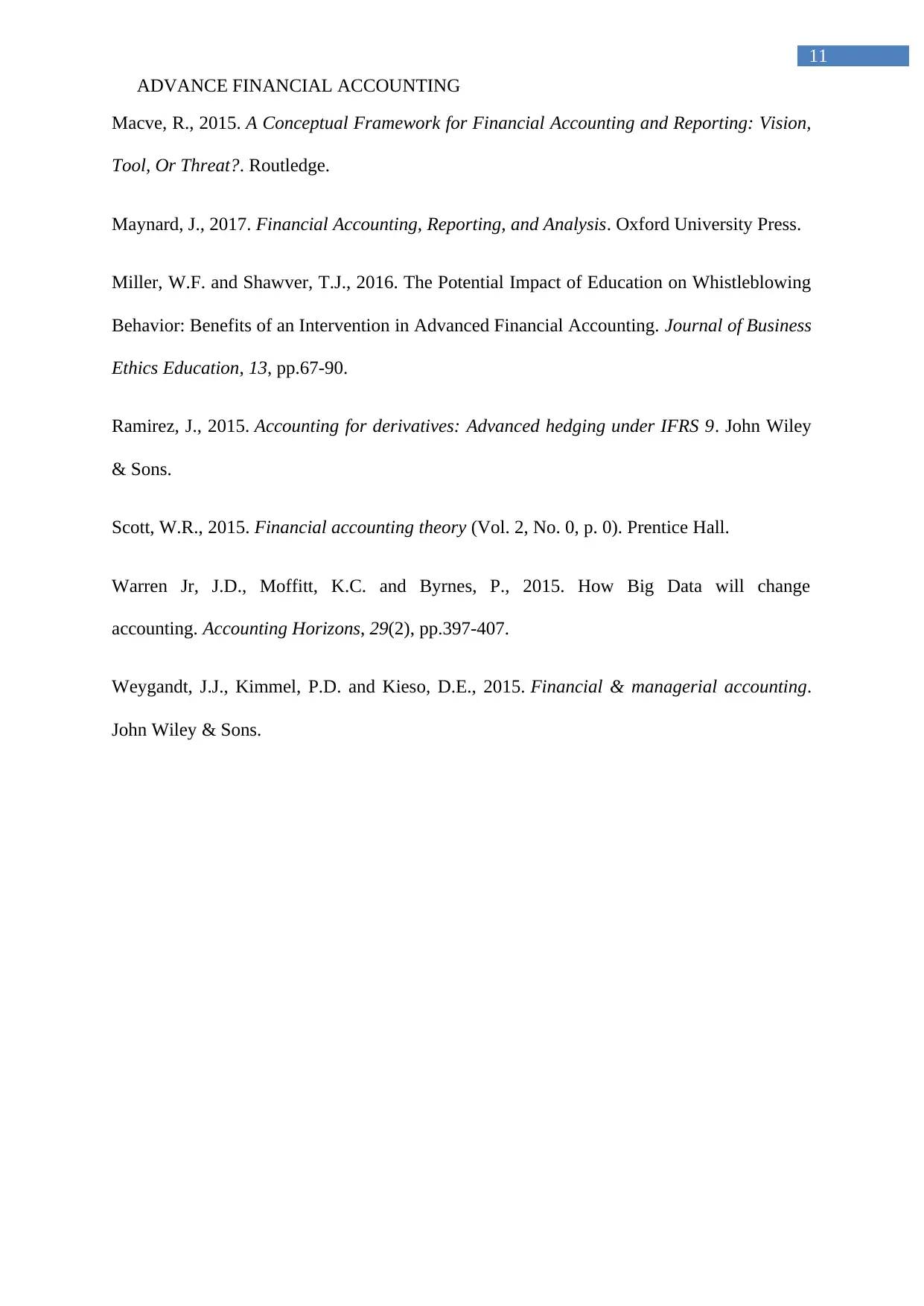
ADVANCE FINANCIAL ACCOUNTING
11
Macve, R., 2015. A Conceptual Framework for Financial Accounting and Reporting: Vision,
Tool, Or Threat?. Routledge.
Maynard, J., 2017. Financial Accounting, Reporting, and Analysis. Oxford University Press.
Miller, W.F. and Shawver, T.J., 2016. The Potential Impact of Education on Whistleblowing
Behavior: Benefits of an Intervention in Advanced Financial Accounting. Journal of Business
Ethics Education, 13, pp.67-90.
Ramirez, J., 2015. Accounting for derivatives: Advanced hedging under IFRS 9. John Wiley
& Sons.
Scott, W.R., 2015. Financial accounting theory (Vol. 2, No. 0, p. 0). Prentice Hall.
Warren Jr, J.D., Moffitt, K.C. and Byrnes, P., 2015. How Big Data will change
accounting. Accounting Horizons, 29(2), pp.397-407.
Weygandt, J.J., Kimmel, P.D. and Kieso, D.E., 2015. Financial & managerial accounting.
John Wiley & Sons.
11
Macve, R., 2015. A Conceptual Framework for Financial Accounting and Reporting: Vision,
Tool, Or Threat?. Routledge.
Maynard, J., 2017. Financial Accounting, Reporting, and Analysis. Oxford University Press.
Miller, W.F. and Shawver, T.J., 2016. The Potential Impact of Education on Whistleblowing
Behavior: Benefits of an Intervention in Advanced Financial Accounting. Journal of Business
Ethics Education, 13, pp.67-90.
Ramirez, J., 2015. Accounting for derivatives: Advanced hedging under IFRS 9. John Wiley
& Sons.
Scott, W.R., 2015. Financial accounting theory (Vol. 2, No. 0, p. 0). Prentice Hall.
Warren Jr, J.D., Moffitt, K.C. and Byrnes, P., 2015. How Big Data will change
accounting. Accounting Horizons, 29(2), pp.397-407.
Weygandt, J.J., Kimmel, P.D. and Kieso, D.E., 2015. Financial & managerial accounting.
John Wiley & Sons.
⊘ This is a preview!⊘
Do you want full access?
Subscribe today to unlock all pages.

Trusted by 1+ million students worldwide
1 out of 12
Related Documents
Your All-in-One AI-Powered Toolkit for Academic Success.
+13062052269
info@desklib.com
Available 24*7 on WhatsApp / Email
![[object Object]](/_next/static/media/star-bottom.7253800d.svg)
Unlock your academic potential
Copyright © 2020–2026 A2Z Services. All Rights Reserved. Developed and managed by ZUCOL.



